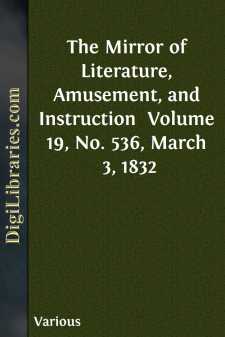Categories
- Antiques & Collectibles 13
- Architecture 36
- Art 48
- Bibles 22
- Biography & Autobiography 813
- Body, Mind & Spirit 142
- Business & Economics 28
- Children's Books 15
- Children's Fiction 12
- Computers 4
- Cooking 94
- Crafts & Hobbies 4
- Drama 346
- Education 46
- Family & Relationships 57
- Fiction 11828
- Games 19
- Gardening 17
- Health & Fitness 34
- History 1377
- House & Home 1
- Humor 147
- Juvenile Fiction 1873
- Juvenile Nonfiction 202
- Language Arts & Disciplines 88
- Law 16
- Literary Collections 686
- Literary Criticism 179
- Mathematics 13
- Medical 41
- Music 40
- Nature 179
- Non-Classifiable 1768
- Performing Arts 7
- Periodicals 1453
- Philosophy 64
- Photography 2
- Poetry 896
- Political Science 203
- Psychology 42
- Reference 154
- Religion 513
- Science 126
- Self-Help 84
- Social Science 81
- Sports & Recreation 34
- Study Aids 3
- Technology & Engineering 59
- Transportation 23
- Travel 463
- True Crime 29
The Mirror of Literature, Amusement, and Instruction Volume 19, No. 536, March 3, 1832
by: Various
Categories:
Description:
Excerpt
Manchester is distinguished among the large towns of the kingdom for its majority of enlightened individuals. "The whole population," it has been pertinently observed by a native, "seems to be imbued with a general thirst for knowledge and improvement." Even amidst the hum of its hundreds of thousand spindles, and its busy haunts of industry, the people have learned to cultivate the pleasures of natural and experimental science, and the delights of literature. The Philosophical Society of Manchester is universally known by its excellent published Memoirs: it has its Royal Institution; its Philological Society, and public libraries; so that incentives to this improvement have grown with its growth. Among these is the Botanical and Horticultural Society, formed in the autumn of 1827, whose primary object was "a Garden for Manchester and its neighbourhood." Previously to its establishment, Manchester had a Floral Society, with six hundred subscribers, which was a gratifying evidence of public taste, as well as encouragement for the Garden design.
We find the promised advantages of the plan thus strikingly illustrated in an Address of the preceding date, "The study of Botany has not been pursued in any part of the country with greater assiduity and success than in the neighbourhood of Manchester. Far from being confined to the higher orders of society, it has found its most disinterested admirers in the lowest walks of life. Though to the skill and perseverance of the cottager we are confessedly indebted for the improved cultivation of many plants and fruits, an extensive acquaintance with the choicest productions of nature, and a philosophical investigation of their properties, are very frequently to be met with in the Lancashire Mechanic. But whilst some knowledge of the principles of Horticulture is almost universal; and the inferior objects of attention are readily procured, it is obvious that the difficulty and expense which attend the possession of plants of rare, and more particularly of foreign growth, form a natural and insurmountable obstruction to the researches of many lovers of the science...." "Whatever regard is due to the rational gratifications of which the most laborious life is not incapable, there is a moral influence attendant on horticultural pursuits, which may be supposed to render every friend of humanity desirous to promote them. The most indifferent observer cannot fail to remark that the cottager who devotes his hours of leisure to the improvement of his garden, is rarely subject to the extreme privations of poverty, and commonly enjoys a character superior to the circumstances of his condition. His taste is a motive to employment, and employment secures him from the temptations to extravagance and the natural consequences of dissipated habits." Further, we learn, one great object of the society is to educate a certain number of young men as gardeners. As "an inviting scene of public recreation," it is observed, "those who are little interested in the cultivation of Botany, and who may regard the employments of Horticulture with disdain, may still be induced to frequent the Botanical garden, for the beauty of the objects, the pleasures of the society, and the animating gaiety of the scene."
The Manchester Garden, we should think, must, by this time, have an Eden-like appearance. The Committee began fortunately. Mr. Loudon, in one of his valuable Gardening Tours, refers to "a few traits of liberality in the parties connected with it; the noble result, as we think, of the influence of commercial prosperity in liberalizing the mind. Mr. Trafford, the owner of the ground, offered it for whatever price the Committee chose to give for it. The Committee took it at its value to a common farmer, and obtained a lease of the 16 acres (10 Lancashire) for 99 years, renewable for ever at 120l a year." He describes the donations of trees, plants, and books, by surrounding gentlemen, as very liberal. Mr. Loudon does not altogether approve of the plan, and certainly by no means of the manner in which the Garden has been planted, yet he has no doubt it will contribute materially to the spread of improved varieties of culinary vegetables and fruits, and to the education of a superior description of gardeners....












